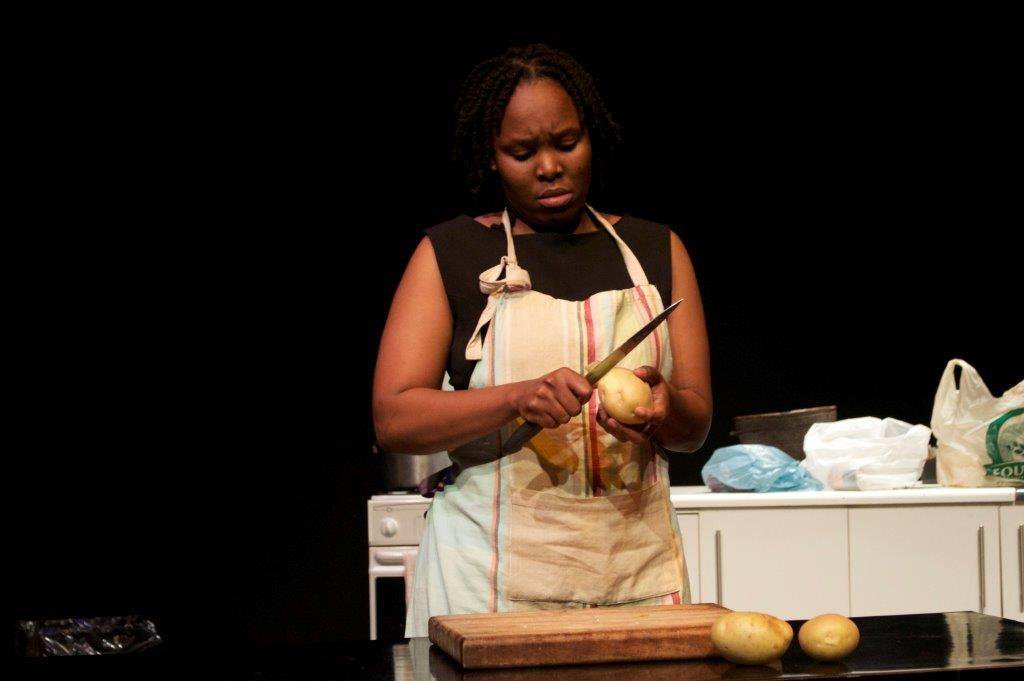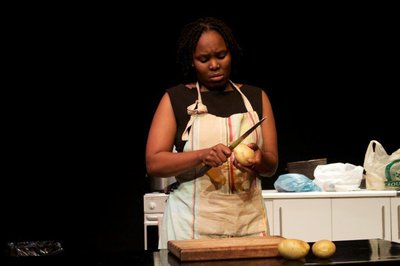BOYKIE AND GIRLIE: THE POLITICS OF A PARTNERSHIP
Meet the eponymous characters: he’s a writer waiting for work, for inspiration, for something to give his life a level of cohesion. Dressed in a ‘Time of the Writer’ t-shirt which has been rather self-consciously made holey, he’s hungry, starving for something to give meaning to it all. She’s a self-made lawyer, holding the relationship together financially, pragmatically. Their almost anonymous names, denoting their gender more than much else, lend them a universality which is quite breath-taking, making you think, on various levels of other classic couples, like Athol Fugard’s Boesman and Lena. Overlooking the specifics of their issues, they are in a sense every couple.
"the combination of performers, words and context are simply delicious to watch unfold. They’re backed by a fabulous set which casts a nod in the direction of Ariel Dorfman’s ‘Delirium’, staged in South Africa a few years ago, replete as it is with an ostensibly functional toilet onstage" -Robyn Sassen
Boykie and Girlie have been together for several years; they live in a comfortable but unfashionable flat somewhere in Johannesburg. They are no longer in the first flush of their lives, experience has roughened their edges. On this particular evening, Girlie returns home and once again finds Boykie in a foul mood. The past and the present collide and what ensues exposes their many different faces: values, ambitions, sexual needs and ability to love.
Set in their kitchen and in the toilet Boykie habitually escapes to, the play seesaws from mood to mood, subject to subject, while Girlie prepares the supper Boykie refuses to eat. It has moments of pathos, of profound emotion, of madness and clarity as the couple spar and cajole, testing each other’s resolve and intentions. In language that is both poetic and coarse, they alternately celebrate and denigrate their relationship dominated by Boykie’s dead end. In a telling exchange, the ‘blocked’ writer and activist calls out to Girlie, “It’s not you that I can’t live with. I’m not strong enough. It’s all so absurd, so trivial, so demeaning . . .” To which she replies, “Hey, you’re vomiting over a pretty full plate.”
Boykie and Girlie are thus both agents and victims, switching from one to the other as the evening unwinds. His ‘hunger strike’, his sexual experimentation, his punctured ego and subsequent sense of self-loathing – all place an enormous strain on Girlie as she has to bear not only the responsibilities of her demanding and important work but the pressure of living with a partner who, despite certain exuberant, almost ecstatic moments, is mired in depression. Having said this, by the end of the play, after having discussed or revealed almost all the facets of their lives, they reach a point where it is mutually agreed to ‘give ourselves a rest’. And so we see them prepare to exit from the sites of battle (the kitchen/toilet areas) and ‘retire to their bedroom’ rather than throw themselves off the precipice of separation. In this way the denouement is not apocalyptic – there is no neat conclusion, whether ‘happy or sad’- their lives will continue with the possibility of positive change even as their final matter-of-fact discussion about ‘Tony and Brenda’, two mutual friends whom they plan to visit after their ‘rest’, degenerates into rhetorical side-stepping.
Boykie and Girlie premiered on 29 July 2014 at the Wits Downstairs Theatre in Johannesburg as part of the SA Season of “Theatre and Politics” organized by Drama for Life.
Audience Responses
I loved it ,my man and i related so much.we want part 2
My man and i loved it and related so much ,thank God fighting is normal lol

